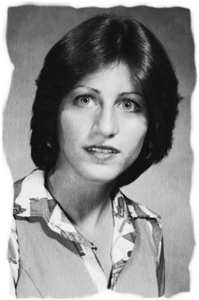

Educator, principal of P.S. 76 in the Bronx
(1957– )
I grew up in a semidetached home where there were always people coming and going—family, people from the block, people from the neighborhood. My mother cooked these Italian feasts so she was prepared for whoever stopped by. If it was dinnertime, they’d just sit down to eat. There would be a three-course meal, starting with the soup, and at the end my father’s job would be to cut the fruit. Then, of course, came the black coffee and lots of conversation around the table.
My brother is eight years older than I am, so if he had friends come by after school they would eat. Whoever came would always sit down and join us, whether it was during the week or on the weekend. My grandmother also lived in the neighborhood, just a few blocks away from us. My father is one of ten kids, and my mother is one of seven, and each of their siblings had four to five children. It was a very large family, with extended family too. My childhood was a good one. You know, comfortable.
My mother had an uncle, Morris, who loved to entertain. He would come occasionally with his buddies and he’d play the harmonica. Even though he worked for the IRT he had a show with his friends who played with a band. They would set up in the backyard and the whole neighborhood would come by. They came for the music, and of course my mother put out food. It was a gathering with music and dancing and eating. It was a simple life, not complicated by too many distractions.
I went to a parochial grammar school and later to parochial high school. In the Catholic schools we still had nuns as teachers. My father owned a dry-cleaning business and we would always take home the habits the nuns wore. He dry cleaned them for the whole school. I always loved school even though it was very strict. I seem to have been very disciplined because I knew that I was in school to do my work. If there were a mischievous boy or someone like that, Sister Mary Eymard would stand him in front of the room. I’ll never forget George Rogee. We were in third grade, and he was chewing gum. Sister made him stand in front of the room with the gum on his nose. That must’ve been about 1957. Sister would also walk around with a ruler and hit your hands. It was intimidating, oh yeah, and yet I had some wonderful nurturing lay teachers as well. And those were the ones I was very involved with.
There was Mrs. McGann, who wore perfume. I loved walking past her. She was also very well dressed, which made her so very different from my mom, who never even wore makeup. I was fascinated with those teachers who came well dressed to school, wore makeup, and smelled of perfume. I was just so amazed at the glamour of it all and it impressed me. And then again, I actually loved the work. I always wanted to be at my desk, I guess, to please them, but when I went home I played school for hours, especially since my father had bought me a school desk for my bedroom. I was always the teacher, and my imaginary playmates were the students. I knew even then that’s what I wanted to be—a teacher.
I always felt that the people in the Bronx were so friendly and down to earth. I bought my first house there but when I moved up to Westchester it was very different. Playdates for the kids? Something we never had when we were growing up.
There’s an old saying, “You can take the girl out of the Bronx, but you can’t take the Bronx out of the girl.” So here I am, back at a school in that borough. I’m home.
* * *
Note: P.S. 76 was the neighborhood school that I attended as a kid. I don’t think we had any particular academic distinctions at that time. It is definitely a better school now than when I was there in the late 1930s and ’40s.